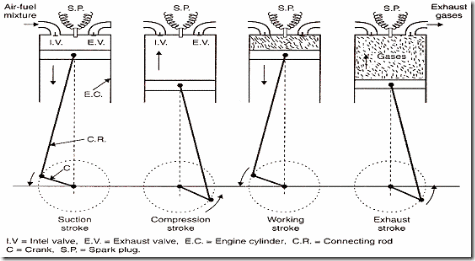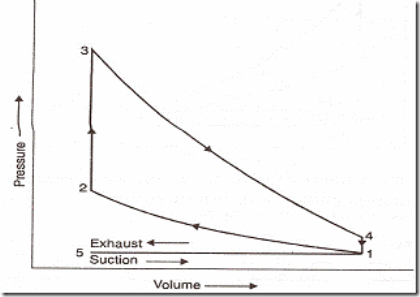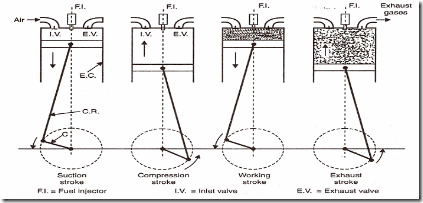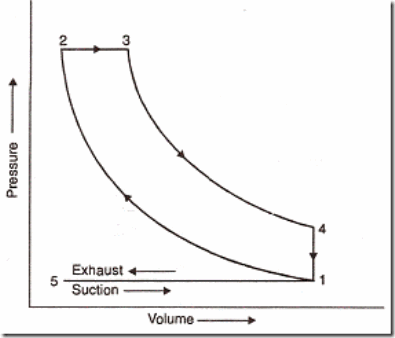To study about 4 stroke diesel and 4 stroke petrol engine.
Introduction
FOUR-STROKE CYCLE ENGINES
- Four Stroke Petrol engine
- Four Stroke Diesel engine
FOUR STROKE PETROL ENGINE
The four stroke-cycles refers to its use in petrol engines, gas engines, light, oil engine and heavy oil engines in which the mixture of air fuel are drawn in the engine cylinder. Since ignition in these engines is due to a spark, therefore they are also called spark ignition engines.
SUCTION STROKE: In this Stroke the inlet valve opens and proportionate fuel-air mixture is sucked in the engine cylinder. Thus the piston moves from top dead centre (T.D.C.) to bottom dead centre (B.D.C.). The exhaust valve remains closed through out the stroke.
COMPRESSION STROKE: In this stroke both the inlet and exhaust valves remain closed during the stroke. The piston moves towards (T.D.C.) and compresses the enclosed fuel-air mixture drawn. Just before the end of this stroke the operating plug initiates a spark which ignites the mixture and combustion takes place at constant pressure.
POWER STROKE OR EXPANSION STROKE: In this stroke both the valves remain closed during the start of this stroke but when the piston just reaches the B.D.C. the exhaust valve opens. When the mixture is ignited by the spark plug the hot gases are produced which drive or throw the piston from T.D.C. to B.D.C. and thus the work is obtained in this stroke.
EXHAUST STROKE: This is the last stroke of the cycle. Here the gases from which the work has been collected become useless after the completion of the expansion stroke and are made to escape through exhaust valve to the atmosphere. This removal of gas is accomplished during this stroke. The piston moves from B.D.C. to T.D.C. and the exhaust gases are driven out of the engine cylinder; this is also called SCAVENGING.
Theoretical P-V diagram of a four-stroke engine
FOUR STROKE DIESEL ENGINE
SUCTION STROKE: With the movement of the piston from T.D.C. to B.D.C. during this stroke, the inlet valve opens and the air at atmospheric pressure is drawn inside the engine cylinder; the exhaust valve however remains closed. This operation is represented by the line 5-1
COMPRESSION STROKE: The air drawn at atmospheric pressure during the suction stroke is compressed to high pressure and temperature as the piston moves from B.D.C. to T.D.C. Both the inlet and exhaust valves do not open during any part of this stroke. This operation is represented by 1-2
POWER STROKE OR EXPANSION STROKE: As the piston starts moving from T.D.C to B.D.C, the quantity of fuel is injected into the hot compressed air in fine sprays by the fuel injector and it (fuel) starts burning at constant pressure shown by the line 2-3.
At the point 3 fuel supply is cut off. The fuel is injected at the end of compression stroke but in actual practice the ignition of the fuel starts before the end of the compression stroke. The hot gases of the cylinder expand adiabatically to point 4. Thus doing work on the piston.
EXHAUST STROKE: The piston moves from the B.D.C. to T.D.C. and the exhaust gases escape to the atmosphere through the exhaust valve. When the piston reaches the T.D.C. the exhaust valve closes and the cycle is completed. This stroke is represented by the line 1-5.
Theoretical p- V diagram of a four-stroke Diesel Engine
Prepared by:
Mr. Sachin Chaturvedi,
Lecturer, Department of Mechanical Engineering,
Brown Hills College of Engineering and Technology,




16 Responses to “Lab Manual | To study about 4 stroke diesel and 4 stroke petrol engine.”
bharat bhushan
thanku . .
shivani
thanks
jayprakash kumar
second law of thermodynamics
Deepak kumar yadav
Thanks
sharan
thanks sir
admin
Thanks for the Comment
Anyewi George
thank you so much
r.m. katkar.
very good
Tirath Kumar
please provide the lab manuals of IC engines & Gas Turbine lab.
munya
Three stars
kiran kumar
Thank u
Sohail Niaz
Thanks
Anurag rajbhar
Thanks
Anurag rajbhar
You write this the wrong tdc to bdc then exert
Anurag rajbhar
Write answer tdc to bdc
Laban wambua musyoka
notify me all about diesel engines new series
.